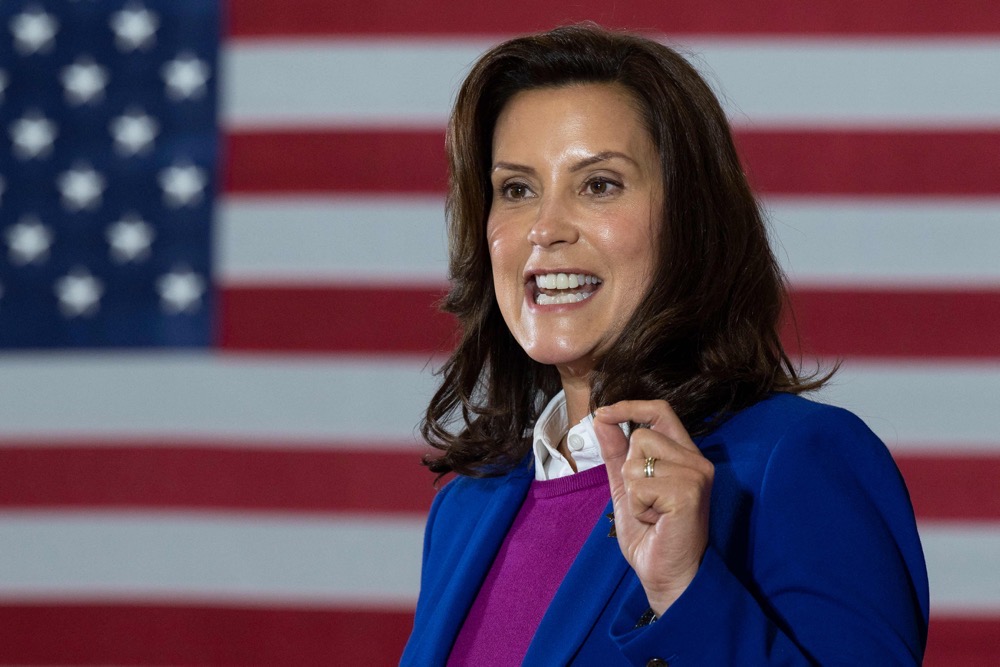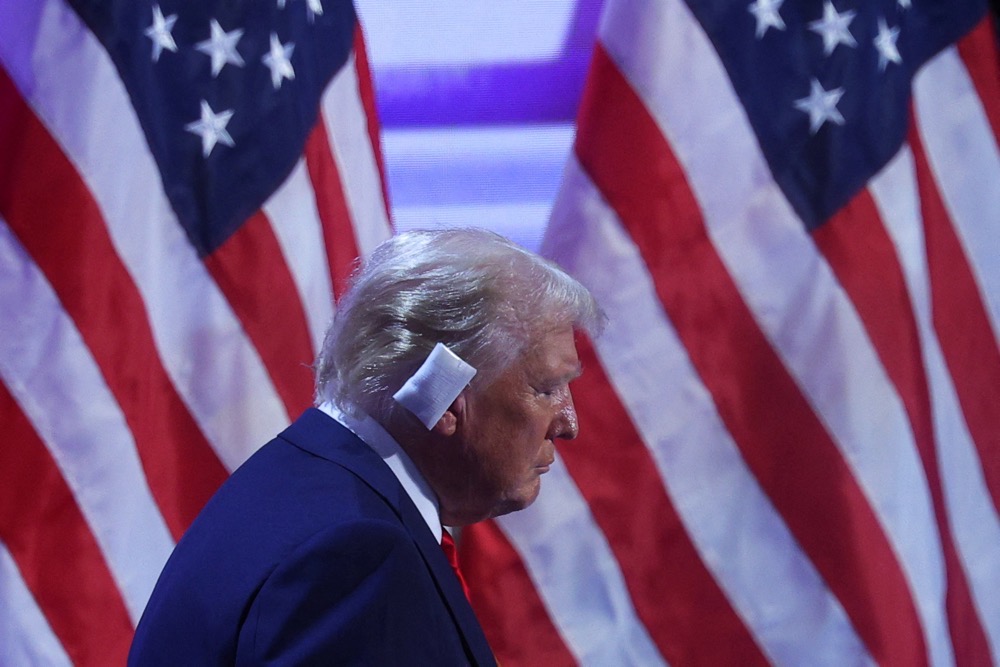NEW YORK CITY/CHICAGO: President Joe Biden’s decision to end his reelection campaign and drop out of the US presidential race has created sufficient momentum for Vice President Kamala Harris to become the Democratic Party’s presidential nominee, according to three Arab American analysts.
Biden, who endorsed Harris in his withdrawal announcement on Sunday, was trailing former President Donald Trump in opinion polls amid a growing Arab American #AbandonBiden movement, and wider demands he drop out of the 2024 race following his disastrous debate performance on June 27 in Atlanta.

Biden was trailing former President Donald Trump in opinion polls. (AFP)
What was to be a coronation for the 81-year-old Biden at the Democratic National Convention in Chicago on Aug. 19 has now become an open contest in which nearly 4,700 party delegates will vote by state for the nominee of their choice to challenge Trump, the Republican Party nominee.
Rana Abtar, a talk show host in Washington D.C. for Asharq News, expects Harris to become the Democratic nominee, although several other candidates might also be considered. However, she believes the Democrats “must show unity” if they are to win the November election.
“Today, what we are noticing is that Democrats are starting to support Harris, one by one,” she told Arab News. “There were some delegates in a couple of states who have already voted to support Kamala Harris. That means that their votes will reflect in the Democratic National Convention.

“The rest of the Democrats who have not supported Harris yet are expected to fall in line soon. At some point we will see all the Democrats, or most of the Democrats, line up behind Harris. It is very important for the Democrats to present a show of unity after the dilemma that their party was facing following President Biden’s announcement that he will not seek a second term.”
Biden’s withdrawal from the race frees up his convention delegates from the nation’s 50 states and provinces to support any candidate during the convention. Many alternative names are being floated, including centrist Sen. Joe Manchin, former Rep. Tulsi Gabbard, former First Lady Michelle Obama, Illinois Gov. J.B. Pritzker and Pennsylvania Gov. Josh Shapiro.
Noting that Harris is popular among African American voters, a traditional core pillar of the Democratic Party support, Abtar said many still view her as a part of the Biden administration’s policies that fueled the #AbandonBiden movement, in which Arabs and Muslims voted in key swing state primaries for “uncommitted” or “no vote” options rather than for the president.

Donald Trump chose JD Vance has his running mate last week. (AFP)
“Harris is not that popular in the polls,” Abtar said. “A lot of Democrats are worried that her chances against Trump are the same as the chances of President Biden against Trump. Of course, in the coming days we will see Harris getting out there, talking to the voters, because in the past, in her role as vice president, she did not speak directly to the American people on many occasions.
“Biden gave her the immigration matter, which by itself put her in a very awkward position, especially given that the Republicans’ main attack against Democrats concerns immigration and border security.
“But I do believe that the most important element here is not Harris. It will be who she will pick as her running mate because voters need excitement. Democratic voters need excitement to get out and vote.”
FASTFACTS
The convention process
-
The Democratic National Convention takes place Aug. 19-22 in Chicago
-
Had President Joe Biden remained in the race, delegates elected to support his candidacy in the primaries would have been ‘mandated’ to cast their vote for his nomination
-
Since Biden has withdrawn, it opens the way for an ‘open convention’ in which delegates are ‘released’ to vote for whomever they wish
-
On Wednesday, representatives of the 50 states and 7 territories are expected to announce who they support for president and vice president
-
Whoever receives a majority will become the official nominee for president and for vice president
Abtar said third-party candidates, such as independent candidate Robert F. Kennedy Jr. and Green Party candidate Dr. Jill Stein, are often viewed as “election spoilers” — people who might drain votes from Harris or even from Trump.
“Kennedy’s numbers are considered pretty high for an independent candidate and his voters might make a difference in the election season by taking away votes from … Trump or Harris … if she gets the official nomination,” Abtar said.
Any of the individuals currently being suggested as replacements for Biden could become nominees for vice president, including Pritzker, a billionaire with presidential ambitions of his own.

Illinois Gov. J.B. Pritzker, who some thought could be a contender, backed Harris on Monday. (AFP)
Amal Mudallali, a former ambassador to the UN and CEO of Bridges International Group, thinks Harris has a “problem of perception.”
She told Arab News: “The perception is that she was not a strong vice president, that she will not be a strong candidate and that she will not be able to defeat Trump.”
Although Democrats seemed to be moving fast to rally behind Harris, including former Speaker of the House Nancy Pelosi’s endorsement on Monday, Mudallali remains cautious.

Former First Lady Michelle Obama name has also been floated in Democratic circles. (AFP)
“It’s all up in the air because there are still very powerful Democrats calling for an open convention and to have an open field for everybody to throw their hats into the ring, and to see if they can get the strongest candidate for the Democratic Party to be able to defeat Trump,” she said.
The impact of the independent candidates in the election cannot be written off either, she added.
“In very close elections, independent candidates can do a lot of harm. Because this election is a very close race — you are talking about a couple of thousands of, or a thousand, votes — that could make or break an election campaign,” Mudallali said.
“Let’s say if Kennedy was able to get a lot of votes from the Democrats, this could hurt Democrats more and that will be a big problem for them.
“But so far we don’t know who the Democratic Party candidate will be. If the individual is a very strong candidate, the party might be able to unite the anti-Trump constituency, which will overwhelmingly vote for the candidate on the Democratic side. In that case, the independents will not make a difference.”

Michigan Gov. Gretchen Whitmer could be her running mate on the first “all woman ticket.” (AFP)
Firas Maksad, a senior fellow at the Middle East Institute, believes Harris is “all but certain” to replace Biden as the nominee, and suggested that Michigan Gov. Gretchen Whitmer could be her running mate on the first “all woman ticket.”
He told Arab News: “The speculation is heavily focused on who will be her vice-presidential running mate, including possibly an all-women ticket should she choose Whitmer. That’s unprecedented and carries risks. But Whitmer could help deliver the key swing state of Michigan, and an all-woman team could re-energize the currently largely demoralized Democratic base.”

“A lot of Democrats are worried that her chances against Trump are the same as the chances of President Biden against Trump,” said Rana Abtar. (AFP)
He added: “Harris’s likability ratings with the American public have never been high. But at this point, the decision by the Democratic Party and President Biden to put her name forward is largely based on funding and finances. She is the only one who will be able to qualify for all the money, the hundreds of millions of dollars, that have been raised so far. Therefore, her choice for a running mate will also be key in terms of bringing around that Democratic base and for the general likability of that Democratic ticket.”
Maksad believes Biden’s withdrawal from the presidential race, and speculation about Whitmer’s addition to the ticket, might hold sway over the strong Arab and Muslim vote in Michigan, many of whom voted against the Biden-Harris team in the Feb. 27 Democrat Party primary contest.

Democrats seemed to be moving fast to rally behind Harris. (AFP)
“Arab Americans are not monolithic,” he said. “They are a diverse group with differing priorities spread out across four battleground states. Michigan gets a lot of attention, but also Florida, Virginia and Pennsylvania.
“In Michigan, where there are 100,000 of them, they have strong feelings about the war in Gaza and President Biden not doing enough to stop the war. Having Biden step aside opens up the potential for the Democratic Party to make inroads among Arab Americans in Michigan again. And should the vice president (choice) in fact be the governor of Michigan, that will then give Democrats even more opportunities to make inroads and win Michigan over again, as a key battleground state.”




























